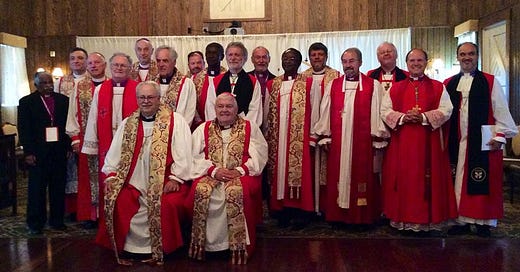As we look forward to a new year, a giant in the recent past of North American Anglicanism has died — the Most Rev. Leonard Wayne Riches.
Drew Collins in his church newsletter has posted a through and warm obit, and I will defer to it.
I will confine myself to what I most remember and appreciate about him.
Bishop Riches was the Presiding Bishop of the Reformed Episcopal Church when I joined the REC in 2004. He served long in that role from 1996-2014. I did not realize it at the time, but he was among those who led the REC out of decades of being a sectarian backwater (For one thing, we had 35 Articles, not 39.) to becoming a mainstream traditional Anglican body while retaining our faithfulness to the authority of Scripture. One of the changes was a new but traditional Book of Common Prayer, much like the 1662 and 1928 BCPs, that was in trial use when I joined. Yes, it had all 39 Articles.
Moreover, he played a vital role in reviving the vision of the REC’s founders of increased communion among orthodox Christians. His current successor, the Most Rev. Ray Sutton, is the foremost North American Anglican point man in ecumenical discussions for the REC and for the Anglican Church in North America (ACNA).
I was there at the Victoria REC General Council (in 2006 I think) when Riches announced that the REC was joining an effort to form a new orthodox Anglican province. The announcement was very well received.
As both the Presiding Bishop of the REC and the Senior Bishop among those forming the new province, he played an important role both in the formation of ACNA and in the REC joining it.
There are those who now question whether the REC should have joined, and I understand that. But the manner in which the REC under Riches did join ACNA was a stroke of genius. We did not dissolve the REC into a diocese or dioceses of the new province. We retained our organization and canons (although we later adjusted them to reflect our membership in ACNA) and remained the Reformed Episcopal Church. We joined ACNA as a subjurisdiction.
If such an arrangement had been done before, I am not aware of it. But it was an inventive solution that satisfied the twofold character of the REC — our desire for increased communion, particularly among orthodox Anglicans, and our unwavering commitment to traditional Anglican orthodoxy. It insulated us from ACNA’s issues since and made it easier for mossbacks like me to stay even during provocations from some other parts of ACNA. So I personally appreciate his innovative role in the formation of ACNA while retaining and protecting the integrity of the REC.
Thus, while greatly assisting the formation of ACNA, he guided the REC in a manner that avoided both isolation and disintegration. Under the circumstances, that was no simple task.
Much more can and will be said about Leonard Riches. But there is little question the REC, ACNA, and North American Anglicanism as a whole owe him much for his long work.
From which may he indeed rest in peace.
—
photo: REC General Council 2014. Bishop Riches is seated in the center beside his immediate successor, the late Most Rev. Royal Grote.




Mark, this is a terrible day to post this. New Year's Eve?! I haven't got time to read it, and I'm America's most isolated man.
Please post it again next week.